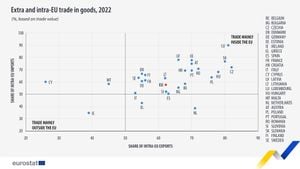The Spanish government unveiled a significant proposal this week, aiming to forgive 83.252 billion euros of debt owed by various autonomous communities. Vice President and Minister of Finance, María Jesús Montero, detailed this ambitious plan, presenting it as a historic effort to alleviate financial pressure on regional governments and improve their fiscal health.
This measure stems from agreements made during the investiture of Prime Minister Pedro Sánchez, particularly involving negotiations with Esquerra Republicana de Catalunya (ERC). One of the key points from this November 2023 agreement included the forgiveness of 20% of the debt owed by Catalonia to the central administration, starting with the 17.104 billion euros debt managed through the Autonomous Liquidity Fund (FLA).
"With this new mechanism, the state will assume the responsibility of these debts, allowing communities to redirect funds previously allotted for debt repayment—about 7 billion euros saved in interest—into public services such as healthcare and education," Montero explained during a press briefing.
But why is this move necessary? The autonomous communities have faced increasing debt levels since the financial crisis, driven largely by adverse economic conditions and inadequate support during tough times such as the COVID-19 pandemic. Montero stated, "This proposal corrects the previous government's failures to manage the financial crisis effectively, which left communities burdened and unable to cope with their fiscal responsibilities. We intend to provide real support for regional governments to restore their financial stability."
The mechanism for implementing this debt relief features three phases aimed at ensuring fairness across all regions. The first phase calculates the debt growth during the financial crisis from 2009 to 2013 and compares it to the lesser increase during the pandemic, highlighting the excessive indebtedness accrued by regions over the years.
According to Montero, regions experienced 109.582 billion euros of increased debt during the financial crisis, compared to just 29.272 billion euros during the pandemic, which translates to potential debt forgiveness of around 80.310 billion euros. Three-fourths of this amount will be distributed based on the adjusted population, which considers various demographic factors, including age and regional economic conditions.
"Our goal is to treat all communities equitably and distribute the debt relief properly, ensuring those most affected by the excessive burdens receive the necessary assistance," Montero added. Under the current proposal, proposals, both Andalucía and Catalonia are set to benefit significantly, receiving 18.791 billion euros and 17.104 billion euros respectively, which represent over 43% of the total debt relief.
Despite this initiative being hailed as generous by the Sanchez administration and multiple regional leaders, opposition remains. The Partido Popular (PP) has been vocal about rejecting the proposal, framing it as rewarding mismanagement and highlighting perceived inequities. "This is merely a transfer of debt from one part of the nation to another, favoring regions governed by leftist parties and independentists with public money," stated PP leader Alberto Núñez Feijóo.
Critics fear this debt forgiveness may enable irresponsible financial planning among some regional governments, prompting concerns about long-term fiscal sustainability. The PP's dissenting opinion is integral to the broader debate on regional financing models and their effectiveness, which have faced scrutiny over the last decade.
The PPP's opposition isn’t merely theoretical as they have confirmed plans to vote against the proposal during the upcoming Council of Fiscal and Financial Policy meeting; their opposition highlights tensions between political parties on how best to approach fiscal governance at both regional and national levels.
While the proposal must clear political hurdles—including debates within the Council and approval via Congress, where it will require coalition support—supporters argue the measure could reshape regional governance dynamics, providing these communities the financial leverage they need to address pressing socio-economic issues.
Some regions, such as the Basque Country and Navarre, are not included as they operate under different financial rules, yet they have expressed interest in negotiating similar compensatory measures within their unique frameworks.
Overall, this proposal is framed not just as fiscal relief but as part of wider efforts under the Sánchez government to reinforce the role of regional governments within Spain’s socio-political framework. Montero remarked on the importance of addressing regional disparities and empowering communities financially, insisting this measure helps fulfill promises made to citizens during difficult economic times.
Looking forward, the proposal is set to undergo scrutiny from various regional governments, providing space for discussions about equity and long-term strategies for sustainability across Spain’s autonomous regions. If approved, it could shape the future balance of power and responsibilities within Spain’s regional governance.



